By Artan Gambeta
– The contradictions and quarrels of the Albanian communists, Ali Kelmendi, Zai Fundo and Sejfulla Malëshova at the meeting of COMINETRN and why was Ali Kelmendi “expelled” from Korça?!-
Memorie.al / Gjergj Dimitrov’s diary “Moscow Years (1934-1945)”, is an authentic chronicle of his activity, when he was General Secretary of the Comintern. The first Albanian mentioned in this chronicle is Ali Kelmendi. But what was the activity of Ali Kelmendi in Moscow, of this man who was one of the few Albanian communists who had embraced communist ideas? The first Albanian communists started their active activity in France, where they were settled as economic immigrants or for studies, under the influence of the French communists. Among them was Ali Kelmendi, who did his best, through the French Communist Party, to contact the Comintern to inform him about the situation in Albania and, in particular, about the activity of the communist groups, which had just started to sprout in Albania. And he achieved his goal.
At the beginning of December 1936, Ali Kelmendin was informed that the Comintern would organize a meeting to examine the state of the communist movement in Albania, and he went to Moscow. But, from the meeting with Gjergj Dimitrov, apparently, the latter did not consider Kelmendi as the number one Albanian communist. Therefore, the Comintern did not decide anything: it limited itself to giving him a 500 dollar allowance, as a kind of “service diet”. Apparently, it was expected that, in the next meeting, representatives of other Albanian communist groups would also be heard.
How did the Albanian communists quarrel at the meeting of the Comintern in Moscow in 1937?
In 1937, as part of the activities commemorating the 10th anniversary of the October Socialist Bolshevik Revolution, a group of Albanian communists were invited to Moscow. On this occasion, the anticipated meeting of KOMINETRNI would also take place to analyze the state of the communist movement in Albania. It goes without saying that the Comintern was interested in spreading its metastases to every corner of the world, that is, even in small Albania, regardless of its role and importance. So, the Comintern was interested in creating a communist party in Albania as well. The meeting took place at the beginning of 1937 and it was chaired by the German Wilhelm Pick, secretary of the Comintern, which covered the Balkan countries. Other members of the leadership of the Comintern and its Balkan Section also participated in that meeting. The group of Albanians included Ali Kelmendi, Zai (Llazar) Fundo, Koço Tashko, Sejfullah Maleshova and Halim Xhelo. The reports, the discussions and… The fights also started…!
Zai spoke about the activity of the KCN (National Liberation Council) that operated in emigration, about the influence of this organization in Albania and on the Albanians of other countries; he spoke as the theoretician of Marxism about the “ideological errors” of the communist groups.
Zain was strongly opposed by Ali Kelmendi on all the issues raised and Sejfullah Maleshova also opposed Zain. Everyone took out their slurs against each other, even going as far as cursing and insulting each other. The war was sparked by the discussions of Ali Kelmendi and Zai Fundo. This quarrel could not but create a bad impression on the delegates of the Comintern, who often intervened to calm the blood, drawing their attention and advising them not to quarrel, and calling on them to find a “consensus “.
But their efforts did not succeed. The “arsonists” did not retreat….! Then Vilhelm Pik was forced to temporarily interrupt the meeting, presenting as a reason that he, (the leader of the meeting), had to deal with the solution of some urgent problems that had arisen in Germany. Was this the real reason, or did Vilhelm Pik want to give the Albanians some time to calm down, think and understand that with their attitude they were bringing the issue to a dead end?! This question remains unanswered.
This answer is probably in some archive, maybe it is in the memories of Vilhelm Pik, if in these memories he (Vilhelm Pik) has attached any importance to the creation of a communist party in Albania, which would be worth it take over the Comintern?! Perhaps the creation of the Albanian Communist Party, the Comintern left under the “patronage” of the Communist Party of Yugoslavia, which was then evaluated as one of its most loyal “sections”, after it disappeared in November 1937 Gorkič and replaced him with Josif Broz Titon, as the plenipotentiary of the Executive Committee of the Communist International, i.e. of the Comintern.
The suspended meeting resumed its work in mid-March of that year, with the breakdown of the tasks of the VIIth Congress of the Comintern. In accordance with these directives, the Albanian communist movement had to build its own work. Directives are directives, but not for the Albanians: the quarrels continued in this second phase of the meeting, despite the convergence of Ali Kelmendi’s views with those of Sejfulla Malëshova.
The efforts of Gjergj Dimitrov, to unite the Albanian communists and the creation of the NPSH
Gjergj Dimitrovi did not stop his efforts to help the Albanian communists. In Moscow, in August 1928, the group of communists of Albanian immigrants was created. This group would function as the Albanian section of the Comintern. In its statute and program, also approved by the Comintern, the task was to: create groups of communists, which then had to create the Albanian Communist Party. From the “Union” organization, 19 young people were sent to Moscow, but not all of them engaged in political activity.
One of the latter was Ali Kelmendi. Prof. dr. Myslim Islami, who has written a very interesting book about Ali Kelmendi, informs us that, at this time, Ali was working in Odesa, as a border officer, thus detached from the political activity of the Albanian communist emigrants. Why?
Prof. Dr. Muslim Islam, among others, writes: “The political and ideological struggle within the Communist (Bolshevik) Party of the Soviet Union was fierce. This spirit made opposing attitudes stand out, different views appeared even among the Albanian emigrants and among the Communists of the Group…!
At the beginning of 1929, a meeting of the Group continued for 2-3 days in a row in an honorable atmosphere. Misunderstandings in some cases were petty. The “leaders” fought over who would be the “first violin”, who would stay in Moscow next to the Comintern, etc. Some thought that leaders should be appointed from above, others opposed and insisted that they be chosen from below.
These discussions and debates led to quarrels and some left the meeting in a demonstrative manner. The other party, accused of lack of discipline and violation of norms, would be expelled from the Moscow Communist Group. The Comintern was informed about all these disputes. The excluded were looking for work, to live now, not as political immigrants, but as economic immigrants.
Ali Kelmendi, border officer in the Soviet Union…!
After these events, Ali Kelmendi settled in Odesa and started working as an officer of the Border forces. But it is known that the Border forces depended on the State Security Commissariat, (next to the Ministry of Internal Affairs), or, more clearly, depended on the OGPU (Political Directorate of Internal Affairs of the Soviet State), which was the organizer and the enforcer of political persecution. So, Ali Kelmendi was recruited into this weapon of the Soviet state (!).
Communists all over the world had a duty (and felt it was a duty) to serve the first socialist state in the world, as a vanguard of the future communist world. The quarrels of the Albanian immigrants found a suitable environment in the quarrels of the former Soviet communist leaders….! But, in December 1928, Ali Kelmendi, this Border officer of the Soviet state, asked to be released from this duty, to serve a friend of his, Ymer Domit, who was paralyzed.
He went with Ymer to Leningrad, but again stayed out of politics, starting work in a factory as an ironworker. On March 3, 1929, Ali Kelmendi, the first Albanian communist to meet Dimitrov, entered politics again: he was accepted into the Communist Group of the Moscow Albanians (!). His political activity resumes.
The vicissitudes and doubts about the first Albanian communist
Ali Kelmendi returns to Albania in 1932 (it is said, as an envoy of the Comintern), and is immediately arrested and held in the Commissariat’s isolation room and as a “suspicious communist”, he is exiled by the relevant authorities of the Zogu Monarchy. Where? In the city of Korça. But the Ministry of Interior did not decide Korça as a place of internment!
In a letter (archival document), it is written: “Ali Kelmendi is mentioned, after having designated the city of Korça as a place of residence, to be handed over to the District Command to escort him to the upper country, for residence, provided that he does not return to the capital”. Aliu chose Korça, apparently, based on what he had heard from the Albanian emigrants of France, about the activity of the Communist Group of this city, but he had also been in this city, in 1924, as an activist of the “Bashkimi” Society. .
Here in this city, Ali immediately began a propaganda activity against the Zogist regime in power. In this way, he gained the sympathy and respect, not only of the members of the Communist Group of Korça, but also of the members of the associations of Korçë artisans. However, quarrels and disagreements were not absent even among the members of the Communist Group of Korça. Doubts began: “Is he really an envoy of the Comintern”?
“Let him present us with a document, so that we can be convinced that he is really an envoy of the Comintern”!
But Ali, such a document did not start from this, and then he asked to come to Greece and Turkey, to “restore” the lost connections with the Comintern through the Communist Parties of these countries. According to the memoirs of Koço Jakova, the communist-firefighter of the Korça Group, Ali’s request was accepted; the Group collected and gave Ali the necessary expenses for this trip.
After spending about two months in Greece and about four months in Turkey, Ali Kelmendi, this “envoy of the Comintern”, could not connect with the Comintern. There are two controversial factors here: First, the Greek Communist Party, but also the Yugoslav one, encouraged by their nationalist-chauvinist factions, did not want the Albanian communists to be directly connected with the Comintern, in order to cast the Albanian communist movement as a “subsection” of their parties, supporting those factions or those individuals who satisfied the appetites of the respective factions of their parties.
Understanding this malicious intention of the neighbors, Ali Kelmendi, gave the idea that the Albanian communist movement, from now on, should rely “on its own forces”. This new idea was also an indirect criticism against the Comintern, for the underestimation of the Albanian communist movement.
Here Ali Kelmendi appears to us as a true patriot. Secondly, the turmoil in the Albanian communist movement could not be affected at that time by the quarrels between the Third International and the Fourth International, that is, by the fierce struggle between Stalin and Trotsky.
As a result, even in the Albanian communist groups, quarrels began between the Stalinists of the Comintern and the Trotskyists. Even during the following half-century, in the communist movement around the world, where the Stalinist line was applied, every opponent, and even every suspect as an opponent, was cursed as an enemy of the party and the people and labeled as: “Trotskyist”.
From the diary of Gjergj Dimitrov for the Albanian communists
September 3, 1938
200,000 francs with an accountability obligation for the Greeks, Zografos, and 500 dollars to Almi (Almi – alias of Ali Kelmendi) for personal expenses.
October 10, 1938
It was necessary to study ways to mobilize immigrants of different nationalities… to support the fight against fascism in the respective countries and to remove from the ranks of these multi-million masses, especially in America, agents infiltrated by fascist governments and various reactionary groups.
January 10, 1945
Stalin called me:
Yesterday I received the Yugoslav delegation. The Yugoslavs informed me that they have proposed to the Bulgarians that: Bulgaria should be part of Yugoslavia, with equal rights to Serbs and Croats. But the Bulgarians have not accepted this proposal and have insisted that Yugoslavia and Bulgaria create a Bulgarian-Yugoslav state union as subjects with equal rights. I told them that the Bulgarians are right and the Yugoslavs are wrong.
The Yugoslavs and the Bulgarians should create a state of two subjects, with equal rights, something similar to the former Austria-Hungary. Otherwise, the introduction of Bulgaria into Yugoslavia would mark the swallowing of Bulgaria. All the more so that the Yugoslavs still do not have a government, so that they can conclude an agreement with Bulgaria.
They would like the Bulgarians to send a diplomatic representative to Belgrade. But the Bulgarian government cannot send a diplomatic representative to the National Committee. It is better to start with a mutual aid pact and then go further…!
Yugoslavs are not experts, it seems clear that Bulgarians are more experts. I had advised that this battle should not take place in Greece. The people of ELAS (People’s Army of the National Liberation of Greece) were not supposed to leave the government of Papandreou.
They started from the opinion that; they don’t have enough strength. It seems clear that they thought that the Red Army would go down to the Aegean Sea. We can’t do that. We cannot send our troops to Greece either. The Greeks have done something stupid.
The Yugoslavs want to take over Greek Macedonia. They also love Albania, and a part of Hungary and Austria. This is unreasonable. I don’t like their behavior. It is known that Hebrang is an intelligent man and he understood what I told him, but others in Belgrade shoot at random.
July 29, 1945
Sokolov (of the People’s Commissariat of State Security) on Albania and on the Albanian exponents, Xoxe and Spahiu, proposed to me that I wait for Xoxe, on the issues of the party and the Albanian state.
August 25, 1945
I waited for the leader of the Albanian Youth delegation, Nako Spiru (he studied in Italy, before the war he lived for several months in Paris and since 1941; he has actively participated in the partisan movement in Albania). I had a long conversation with him about Albanian issues, regarding the Balkan situation and the international situation in general. Memorie.al




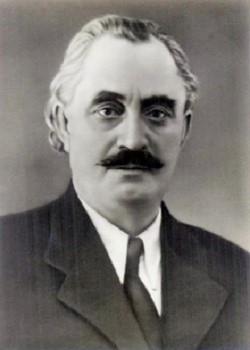
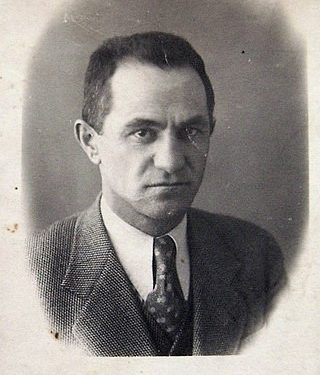
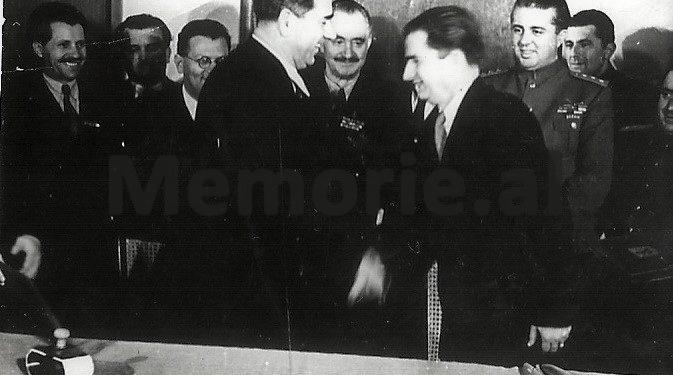
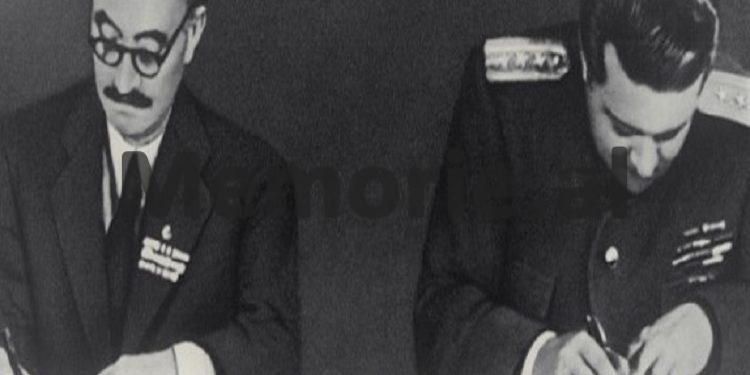
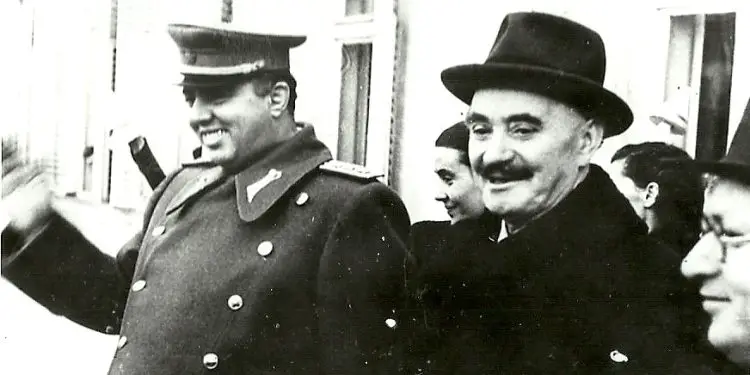
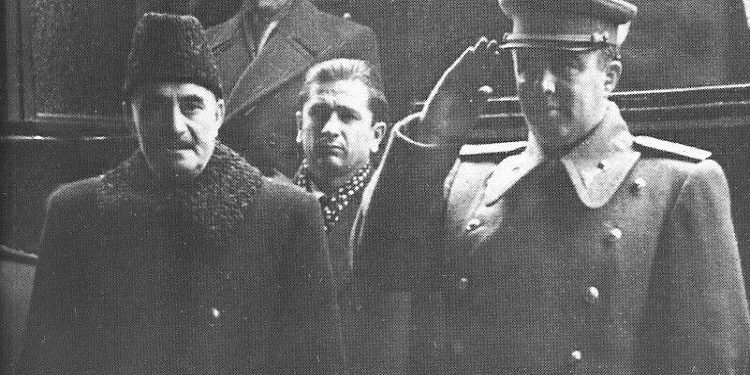
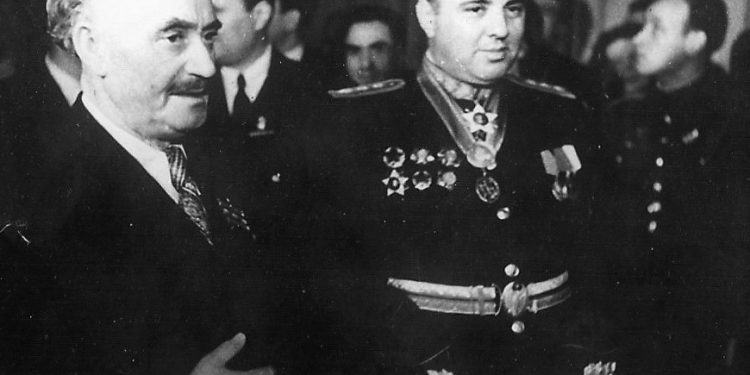

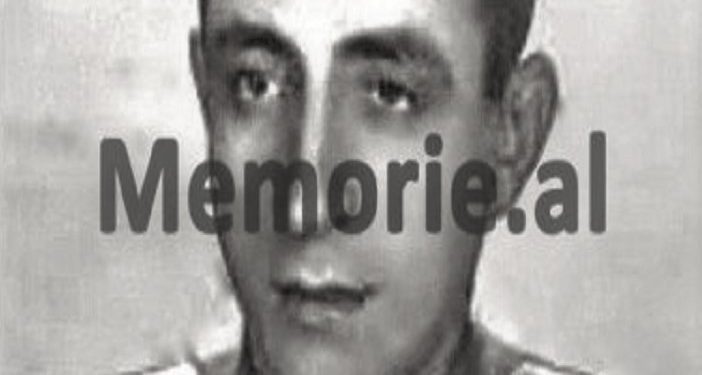
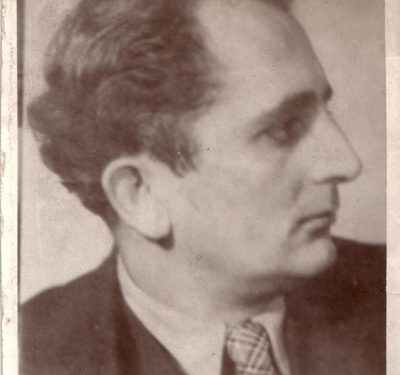
![“The ensemble, led by saxophonist M. Murthi, violinist M. Tare, [with] S. Reka on accordion and piano, [and] saxophonist S. Selmani, were…”/ The unknown history of the “Dajti” orchestra during the communist regime.](https://memorie.al/wp-content/uploads/2026/02/admin-ajax-3-350x250.jpg)
![“In an attempt to rescue one another, 10 workers were poisoned, but besides the brigadier, [another] 6 also died…”/ The secret document of June 11, 1979, is revealed, regarding the deaths of 6 employees at the Metallurgy Plant.](https://memorie.al/wp-content/uploads/2026/02/maxresdefault-350x250.jpg)




